The Meditating Ruminator
I was speaking with a sober friend the other day about the wonders of a word: ruminate.
It is a good word for anyone, sure, but I think it has a particular resonance for the alcoholic or addict. We are ruminators. We overthink and obsess.
Let me qualify and speak to my mind in particular for a moment. Ruminate may not carry a negative connotation for some people, bur for me, to ruminate is to suffocate in negative thinking. My thoughts are a train; they find a track. I’m like a conductor. While it may appear I am in control, there isn’t any choice about the course I take. I find it very difficult to interrupt those patterns of thought.
It starts with something simple. Maybe it’s an appointment I have to take a child to that week. Just because the appointment is on Thursday doesn’t stop me from worrying about it Monday. How am I going to get out of work? and What will my students do without me? are some of the preliminary thoughts. Before long, however, as I ruminate, thoughts spiral from one unaccomplished task to another. Just think of how unprepared you are for this week. It’s at this time that juggernaut of comparative envy crashes the party: there are teachers who have the entire quarter planned already. Thoughts then snowball from a simple point of logistics to deep chasms of fear, doubt, and worry—the sort that dismantle who I am. All of a sudden, I am not enough as a teacher. Then a man. Before I can sip my coffee, I have become an unworthy human, someone fundamentally incapable in life.
This may seem extreme or it may hit home. Perhaps you can relate to the ruminations of an alcoholic mind even if you’re not an alcoholic. Regardless, a helpful thought, and the topic of this post, the first of March’s mundane miracles, is how does a ruminator meditate?
I didn’t get from ruminator to meditator—and a meditator I am, however reluctant—overnight.
Initially, my working definition of meditation was listening. Prayer is asking for help, meditation is listening for the answer. I heard this in recovery, and the simplicity was reinforced in the books of my favorite non-fiction recovery author, Anne Lamott. I recommend Traveling Mercies and Grace (Eventually) if you haven’t read her. Simplifying meditation is a requirement to combat the complexity of my ruminator. Fire does not conquer fire; water does. If I don’t start somewhere simple in my spiritual journey, I will eventually be contributing more to the problem than its solution.
So I began there.
I listened for answers to my prayers instead of coming up with my own solutions. This understanding of meditation gave me a simple formula for discerning God’s will. With help from my sponsor, I came to believe that God’s will is the more difficult or uncomfortable path. Doing the more difficult thing is most often doing the right thing. And doing the right thing is a muscle that, when exercised, becomes a working part of my personality.
William James, in his book Varieties of Religious Experience, writes of the powerful yes impulse in humans. I am paraphrasing from memory here, so correct me where I’m wrong, but I remember him describing the instinct to say yes as a wild intoxicant. Alcoholics, addicts, we understand. I can write with confidence that I never once said no to a drink or drug. While drinking, my yes instinct was ignited and irreversible. I’ve written on the blog before about the miracle of first saying no.
This sort of wild openness explains my heightened ability to ruminate. I don’t want to pause and check each thought as it passes. I’m in a constant state of improv, answering yes and in perpetuity. For me, learning to say no, learning to pause, was a long and difficult chore.
But it is where this ruminator began his meditation practice.
After cultivating the ability to say no and to pause, the next thing I learned to do was to focus on what I’m thinking about.
This is where I have spent the bulk of my sober time. I’m just not someone who can sit and quiet his thoughts, which was my working definition of meditation for the better part of my 11 years sober.
As an alternative, I embraced active meditation, the basic premise being activate your body to quiet your mind. Here is an example.
I play pickup basketball twice a week. I find it incredibly therapeutic. My ruminator may have had his way with my thinking all day, but when I step onto the court, everything shuts down. I become focused on the game. Basketball consists of a flurry of decisions. To be a better player, you must seek to better your decision making. And the urgency of the game requires you to make them faster and faster. You are under fire. It is the opposite of lining up a golf ball and adjusting for wind direction. I love basketball because the factors are simple, instinctual. It falls right in line with my desire for frenzied mental activity. But because I am exhausting that part of my mind, because I am tiring my ruminator, I walk away from the court without a single care or concern. To think of basketball as meditation is like thinking of how a wrecking ball busts through wall after wall until nothing is left to stand in your way.
The only problem is, you can’t always find a game. At some point, you have to develop a more ritualistic daily practice.
I’ve written about the way I write to meditate (“Anyone who doubts the theory of perpetual motion has not been inside my head”) so I won’t go into great depth here on the subject. Just know that for a long time, I wrote and called it meditating. If basketball is the physical exhaustion of my ruminator, then writing is the mental.
In the course of my recovery, the wild yes impulse has made for some extreme solutions for my extreme problem.
Playing basketball to the point of utter exhaustion is one example, and waking up at 4:30 in the morning every day for a year to write a novel is another. But every now and then, saying yes to things in recovery can lead me down that moderate middle ground of unsuspecting contentment—the very ground on which the miracle of the mundane is paved.
When my sponsor asked me if I wanted to go on a spiritual retreat with him, I said, “yes” before my ruminator could convince me to find a way out of it. That retreat in January did wonders for my meditation practice. Here is what I learned.
Meditation does not mean quieting the mind; it means practicing mindfulness.
I get quiet and focus on my breath for a few seconds, then touch the fingertips of one hand against the other. Then, I examine each thought as it passes. I try to filter this thought through a simple binary category: do I need to do something about this worry or concern today? If my answer is no, then I let the thought go. If my answer is yes, then I ask what needs to be done today, to relieve my ruminator of that concern before it spirals out of control and begins to affect my self-esteem.
What I’ve learned in this practice is that most of my thoughts are aggravated by imaginary problems, existing in an alternative future. Sometimes, the problems are connected to my past. But I don’t need to worry. If you become honest with yourself and the world, you don’t need to worry. Nowadays I can trust in what I think I would have said or did because that person has been forged in that simple practice of doing the next right thing.
And for all the work I’ve put into staying sober, I should reap the benefits of a worry-free existence.
So I keep at it, one day at a time.

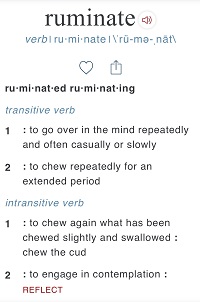
 Previous Post
Previous Post Next Post
Next Post
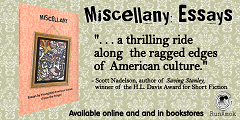


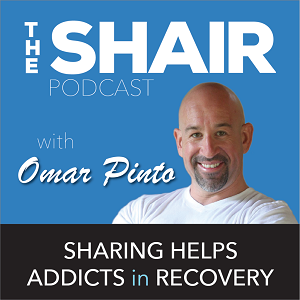

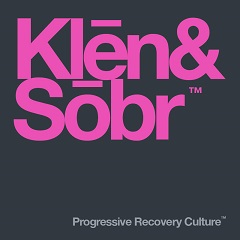



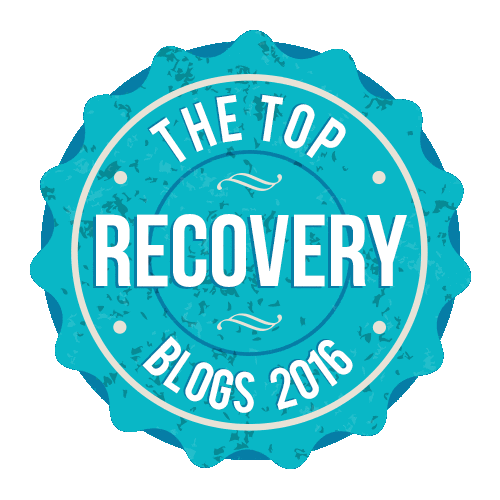


Hi Mark! I had so many ruminating thoughts, I could fill a giant book!
I still do, but I am getting better! Far from perfect.
I can talk myself out of going to yoga, by analyzing the pros and cons, how I feel, if this or if that, or whatever! I drive myself nuts!
I am working with Paul Silva!
Learning to reframe, use mantras, breathe, but most importantly, learning to life life with ease.
I love your mindfulness technique!
xo
Wendy
Thanks Wendy! It’s definitely been what has worked for me. Paul is a great coach. I enjoy getting his emails and updates. That guy’s spirituality is rock solid. I’m so glad it’s been helpful for you. Nice to hear from you! Have a great week, Mark.
I have been very antsy (and “angsty”) for the past few days. Yesterday I said to P, “something is just not right with me” and her reply was, “i noticed you haven’t been meditating as much.” WOW!!
DUDE! Come on, that’s good stuff right there! I tell you man, this new approach to meditation is exactly what I needed. I always thought I was just different (go figure) that I couldn’t meditate like other people because I am that terminally unique type of person. But mindfulness is where it’s at. Not thinking less, but getting better at processing what I’m thinking about! I know a get together is in order. I hope we can make that happen soon. Mark
Practicing mindfulness. THAT is a powerful lesson.
OMG my head doesn’t stop with the worrying and the anxiety. This is what got me back to drinking sooo many times. I totally relate to everything in this post!
I try to meditate for 20 a day. missed out this week cause stuff was too hectic round here and I could littetly not find 5 minutes to go to the toilet. Overall my practice is sitting watching my insane monkey mind flit from one thing to the other with a couple of still moments in between. The true benefits are cumalative when you do it every day impulse controll is easier and that is a BIG plus me:)
So glad you could relate! It’s funny, since publishing this post (already) I have got out of the habit. It takes so long to make a habit and it can be broken so easily. Geez. I’m back in my head as far as parenting, teaching, writing. I needed your comment actually to remember just to try. Try some. Meditate. Find those 5 minutes (even if they are on the can). Really good to get your note, Hurrah. Nice to catch up.